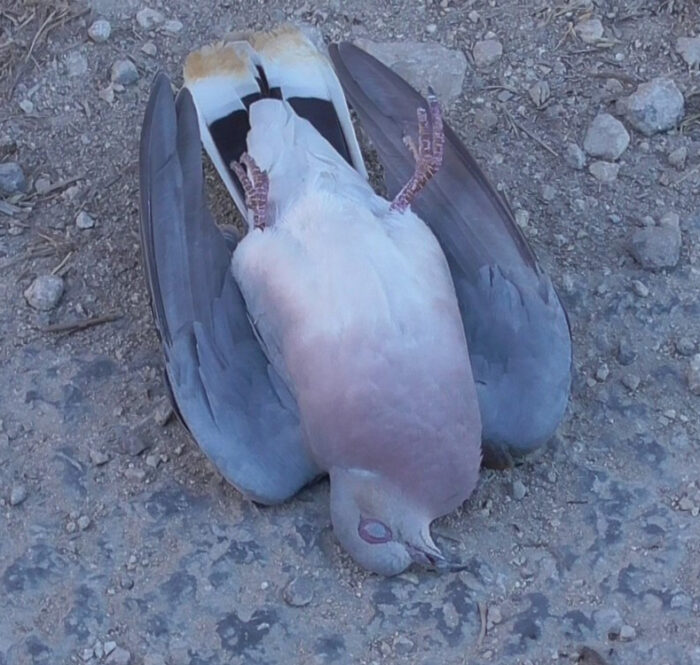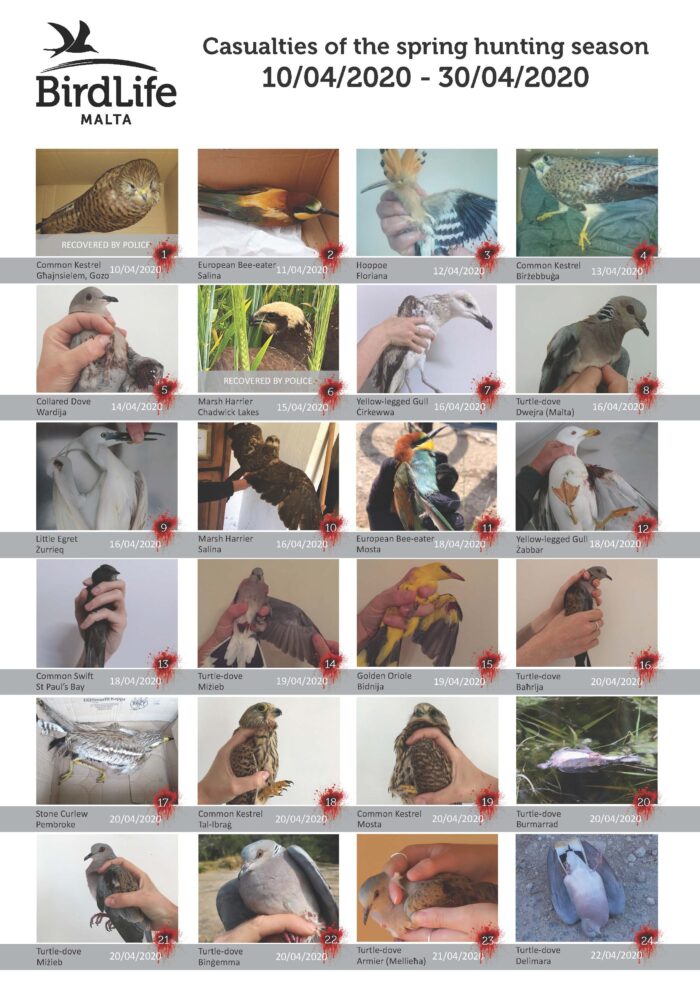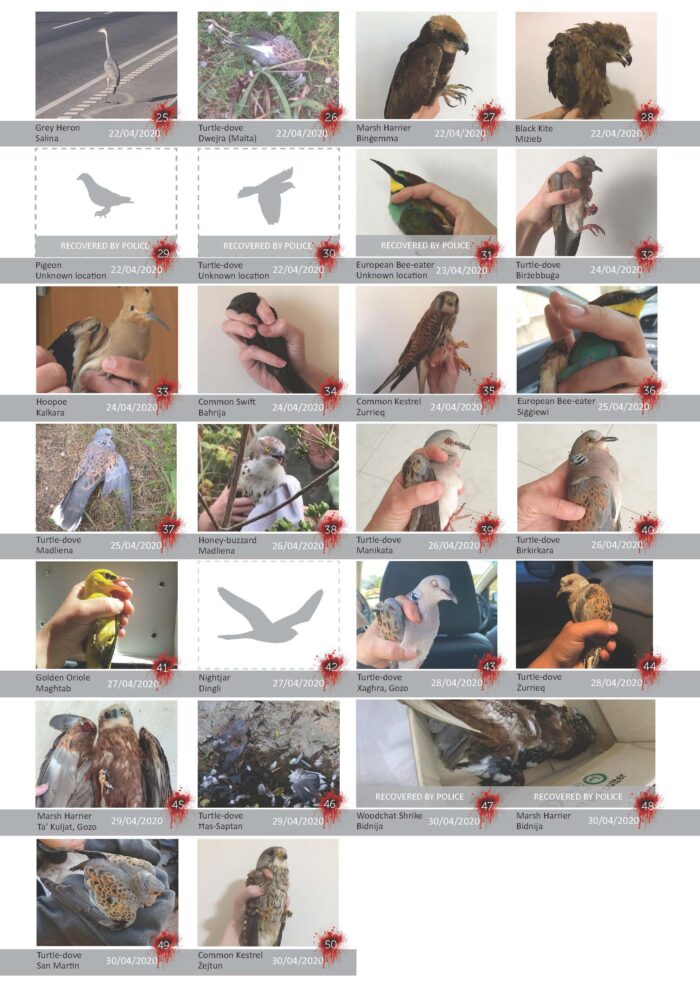The season which came to a close a week ago was a spring hunting season on Turtle-dove. Results obtained from this year’s three-week spring hunting season prove that the derogation to hunt Quail was just a deliberate smokescreen allowing the illegal hunting of protected Turtle-doves.
Results from this year’s spring hunting season to be sent to the European Commission prove derogation was just a smokescreen allowing illegal hunting of vulnerable Turtle-doves
- Over 167 illegalities observed by an average of two BirdLife Malta teams during the three-week season
- Total of 50 illegally shot protected birds recovered, 18 of which were Turtle-doves
- Sharp increase compared to 12 in 2019 and more than the last three spring hunting seasons put together
- Staggering 65% of active hunters observed hunting Turtle-doves, with only 21% seen genuinely hunting for Quail
- Police presence noticed only in 11% of the hunting hotspots visited
- According to WBRU statistics, 86% of licence-holders did not declare catching a single Quail
These results being released today by BirdLife Malta together with a video summarising the highlights of the 2020 spring hunting season which ran between the 10th and 30th of April will now be sent to the European Commission.
Limitations as a result of the COVID-19 pandemic crisis this year did not permit volunteers from across Europe to join BirdLife Malta’s annual Spring Watch camp in overseeing the season’s illegalities. Nonetheless, an average of two teams during hunting hours recorded over 167 illegalities during the three-week season, the majority of which concerned the illegal targeting of Turtle-doves. This included the use of illegal hunting methods such as Turtle-dove decoys and modified shotguns capable of firing more than three rounds.

The Government deliberately chose the season dates aware of the Quail hunting season coinciding with the peak migration of Turtle-dove; while also aware that police had numerical and tactical difficulties in apprehending hunters targeting Turtle-doves. Assistance to enforcement authorities from the Wild Birds Regulation Unit (WBRU) – which was illegally placed under the Ministry for Gozo – remained absent throughout the season.
Police presence compared to the intensity of hunting turned out to be weak, with BirdLife Malta teams only noticing the presence of police officers in just 11% of the hunting hotspots visited. Administrative Law Enforcement (ALE) police officers were only assisted by a small number of extra officers which means that the seven officers per 1,000 hunters during hunting hours as requested by the derogation could hardly be met. As a result strict supervision could not be guaranteed to 6,148 hunters granted the licence to hunt, especially during the peak Turtle-dove migration period which kicked off in earnest from 19th April onwards.
In fact a general feel of an open hunting season on Turtle-dove could be clearly observed by BirdLife Malta teams. A staggering 65% of active hunters were observed stationary in hides and locations good for Turtle-dove migration while only 21% of hunters seen in mornings were genuinely hunting Common Quail. Turtle-dove hunting hotspots such as Miżieb and Aħrax were heavily frequented by hunters during this period and it is unknown whether police carried out roadblocks successfully in such areas despite BirdLife Malta’s request to do so. BirdLife Malta can also confirm that hunting holidays in Gozo (a mecca for Turtle-dove hunting) for Maltese hunters were also permitted during the season, with hunters allowed to freely travel to Gozo for this purpose.
Statistics issued by WBRU to the ORNIS Committee earlier this week confirm that the vast majority of hunters were in fact not hunting Quail. 86% of licence-holders did not declare catching a single Quail despite being allowed three weeks to do so.
Further confirming the targeting of Turtle-doves and the lack of strict supervision is the number of known illegal hunting casualties recovered by BirdLife Malta and police during the season. A total of 50 illegally shot protected birds were recovered this year, out of which the largest number (18) were Turtle-doves – with two teams out in the morning encountering first-hand dead or injured doves while visiting hunting hotspots in Malta and Gozo. Compared to recent past spring hunting seasons, this was the worst-ever. With a total of 50, this year we have in fact received more than four times the birds we collected last year (12) and more birds than the last three spring hunting seasons put together (45).
These results documenting the various deliberate flaws that have characterised this season aimed solely for hunting Turtle-doves under the guise of a derogation to hunt Quail will now be sent to the European Commission. We had already provided our arguments to the Commission on how a hunting season for Common Quail based on hunters not reporting their catches last autumn was unjustified. We had also already pre-empted how this season would have turned out to be a massacre on Turtle-doves. The results we’re publishing today simply confirm all this, and they will now be formally reported to the European Commission’s Directorate-General for Environment.
BirdLife Malta reiterates its position that spring hunting for Turtle-dove has no future in Malta and the European Union (EU), and the Maltese Government should be held accountable for letting this happen. We now expect the European Commission to take action against Malta.
Read the Maltese version of the press release here.
Watch the video summarising the highlights of the spring hunting season 2020 below.


